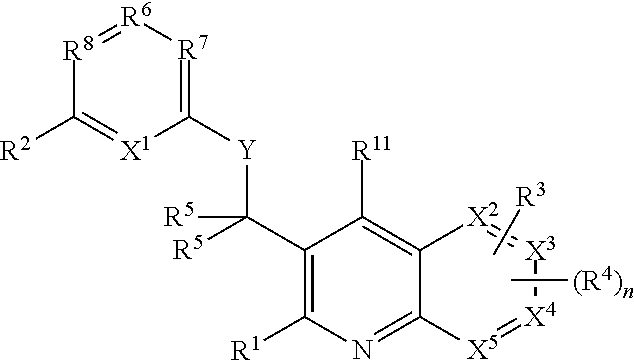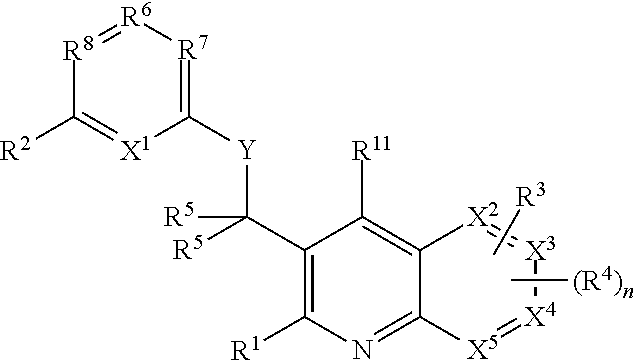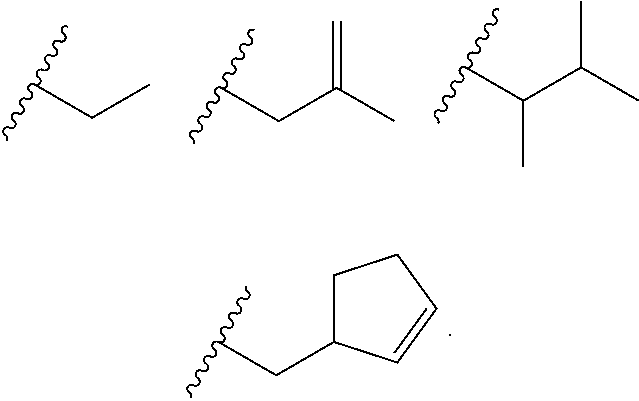Heterocyclic compounds and their uses
- Summary
- Abstract
- Description
- Claims
- Application Information
AI Technical Summary
Benefits of technology
Problems solved by technology
Method used
Image
Examples
example 1
(S)-N-(1-(7-fluoro-2-propylquinolin-3-yl)ethyl)-9H-purin-6-amine
[0109]
[0110]A reaction flask containing N,N-diisopropylethylamine (101 μL, 581 μmol), 6-chloropurine (66 mg, 426 μmol) and (S)-1-(7-fluoro-2-propylquinolin-3-yl)ethanamine (90 mg, 387 μmol) in n-butanol (3 mL) was heated to 110° C. After the reaction was determined to be complete, the solvent was removed in vacuo. Purification by column chromatography using 0-70% gradient of (90:9:1 DCM:MeOH:NH4OH) in DCM. Further purification was performed by slurrying the crude product in ethyl ether and decanting away from an insoluble contaminant. Concentration afforded (S)-N-(1-(7-fluoro-2-propylquinolin-3-yl)ethyl)-9H-purin-6-amine. LC / MS (M+1)=361.2. 1H-NMR (400 MHz, CDCl3) δ 8.38 (s, 1H), 8.15 (s, 1H), 7.96 (s, 1H), 7.69 (dd, J=9.0, 6.3 Hz, 1H), 7.66 (dd, J=10.6, 2.7 Hz, 1H), 7.23 (td, J=8.6, 2.3 Hz, 1H), 6.43 (td, J=8.6, 2.3 Hz, 1H), 5.95 (br s, 1H), 3.12 (m, 2H), 2.20-1.80 (series of m, 4H), 1.74 (d, J=6.6 Hz, 3H), 1.07 (t, J=...
example 2
(S)-tert-Butyl 4-((3-(1-(6-amino-5-cyanopyrimidin-4-ylamino)ethyl)-7-fluoroquinolin-2-yl)methyl)piperazine-1-carboxylate
[0117]
[0118]To a reaction flask containing DIEA (51.3 μL, 0.293 mmol), 4-amino-6-chloropyrimidine-5-carbonitrile (39.7 mg, 0.257 mmol), and (S)-tert-butyl 4-((3-(1-aminoethyl)-7-fluoroquinolin-2-yl)methyl)piperazine-1-carboxylate (95 mg, 0.245 mmol) (made from (S)-3-(1-(1,3-dioxoisoindolin-2-yl)ethyl)-7-fluoroquinoline-2-carbaldehyde and tert-butyl piperazine-1-carboxylate according to General Methods G and C) was added n-butanol (2.5 mL). The reaction was heated to 80° C. for 3.5 h, cooled to 0° C., and filtered. The precipitate was washed with cold 2:1 ethanol:ether and the solid was recrystallized from ethanol to afford (S)-tert-butyl 4-((3-(1-(6-amino-5-cyanopyrimidin-4-ylamino)ethyl)-7-fluoroquinolin-2-yl)methyl)piperazine-1-carboxylate. LC / MS (M+1)=507.2 1H-NMR (500 MHz, DMSO-d6) δ 8.54 (s, 1H), 7.98 (dd, J=9.0, 6.4 Hz, 1H), 7.98 (s, 1H), 7.76 (d, J=7.6 Hz, 1...
example 3
(S)-N-(1-(2-butyl-8-fluoroquinolin-3-yl)ethyl)-9H-purin-6-amine
[0129]
[0130](S)-N-(1-(2-Butyl-8-fluoroquinolin-3-yl)ethyl)-9H-purin-6-amine was synthesized from (S)-2-(1-(2-butyl-8-fluoroquinolin-3-yl)ethyl)isoindoline-1,3-dione according to General Methods C and D. LC / MS (M+H)=365.2. 1H-NMR (400 MHz, CDCl3) δ 13.5 (br s, 1H), 8.38 (s, 1H), 8.13 (s, 1H), 7.97 (s, 1H), 7.47 (m, 1H), 7.32 (m, 2H), 6.41 (br d, J=6.9 Hz, 1H), 5.97 (br s, 1H), 3.20 (m, 2H), 2.05-1.80 (series of m, 4H), 1.75 (d, J=6.9 Hz, 3H), 1.50 (m, 2H), 0.96 (t, J=7.4 Hz, 3H) ppm.
PUM
| Property | Measurement | Unit |
|---|---|---|
| Molar density | aaaaa | aaaaa |
| Molar density | aaaaa | aaaaa |
| Molar density | aaaaa | aaaaa |
Abstract
Description
Claims
Application Information
 Login to View More
Login to View More - R&D
- Intellectual Property
- Life Sciences
- Materials
- Tech Scout
- Unparalleled Data Quality
- Higher Quality Content
- 60% Fewer Hallucinations
Browse by: Latest US Patents, China's latest patents, Technical Efficacy Thesaurus, Application Domain, Technology Topic, Popular Technical Reports.
© 2025 PatSnap. All rights reserved.Legal|Privacy policy|Modern Slavery Act Transparency Statement|Sitemap|About US| Contact US: help@patsnap.com



